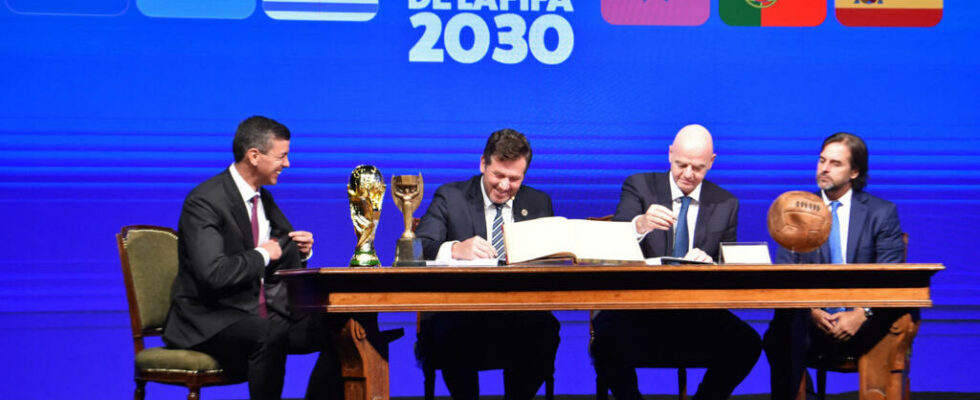Despite criticism of the environment and human rights, the 2030 World Cup was entrusted on Wednesday December 11 by Fifa to the Spain-Portugal-Morocco trio, with three matches in South America. The 2034 edition was awarded to Saudi Arabia.
4 mins
The 211 member federations ratified this double designation by a single vote, during a virtual Congress. The absence of competition, after a series of renunciations for the Global 2030 and an express procedure for 2034, swept away all suspense.
The “Centenary World Cup” must unite six countries, an unprecedented arrangement since the first edition of the jewel of global football in 1930, concentrated in three stadiums in Montevideo, with 13 selections involved, a number of participants which has continued to grow – 32 at the 2022 World Cup and 48 from 2026.
After three matches in Uruguay, Argentina and Paraguay, scheduled for June 8 and 9, 2030, in the cool of the southern winter, the six teams concerned and their supporters will cross the Atlantic for the other 101 matches, from June 13 to 21 July.
With 11 of the 20 stadiums proposed, Spain should be the main host after having already organized the 1982 World Cup. But Morocco, five unsuccessful candidates for the organization, will become the second country on the African continent to host it. , after South Africa in 2010.
Saudi sports diplomacy
Spain and Morocco are still competing for the opening match and the final, respectively proposing the Santiago-Bernabéu in Madrid or the Camp Nou in Barcelona and the future Hassan-II enclosure between Casablanca and Rabat, which aims to become the “largest stadium of the world” with 115,000 places.
Portugal, organizer of Euro 2004, but never associated with a football World Cup, for its part offers the two stadiums in Lisbon and that of Porto, and is seeking one of the semi-finals.
Also readWorld Cup 2030: Morocco, from the realization of a dream to future economic benefits
Invoking the principle of continental rotation, Fifa had limited its call for applications for the 2034 edition to the Asian and Oceanic confederations, carried out briskly in a short month in the fall of 2023.
And Saudi Arabia, the emerging superpower of world sport – from F1 to the future e-sport Olympics, including the 2029 Asian Winter Games – found itself the only candidate after the renunciation of Australia and Indonesia, and the shelving of China’s footballing ambitions.
The ultraconservative kingdom, launched into a strategy of economic diversification and improvement of its image, currently only has two of the 14 stadiums with at least 40,000 seats required.
Beyond the logistical challenge, the scorching summer could force the competition to be moved to winter or late autumn, as during the 2022 World Cup in Qatar, but we will have to deal with Ramadan, expected in December.
Climate and human rights
Above all, the tricontinental formula of 2030 combined with the planned designation of Saudi Arabia was greeted by a concert of criticism: Amnesty International and the organization Sports and Rights Alliance (SRA) even called last month on Fifa to “interrupt the application process”.
“ If the World Cup has become so cumbersome in its design that Fifa has no choice but between Saudi Arabia and hosting a tournament in six countries, then the model needs to be reconsidered », For its part, estimated the Football Supporters Europe (FSE) association.
For 2030, FSE deplores “ unnecessary air travel » teams, media and supporters, against the environmental commitments of the organization, even if Fifa emphasizes for its part that 101 of the 104 matches will take place “ in a group of neighboring countries “.
But it is above all the “ red carpet rolled out for 2034 for a host with an appalling human rights record » which the supporters’ organization relates to. NGOs point to several risks, including the exploitation of migrant workers, who will be mobilized en masse to upgrade infrastructure, and the discrimination that LGBT supporters and foreign visitors could suffer.
In its assessment report, FIFA estimates that Saudi commitments to human rights will involve “ a significant effort in time and energy » by 2034, but sees “ a significant probability that competition will serve as a catalyst for current and future reforms “.
